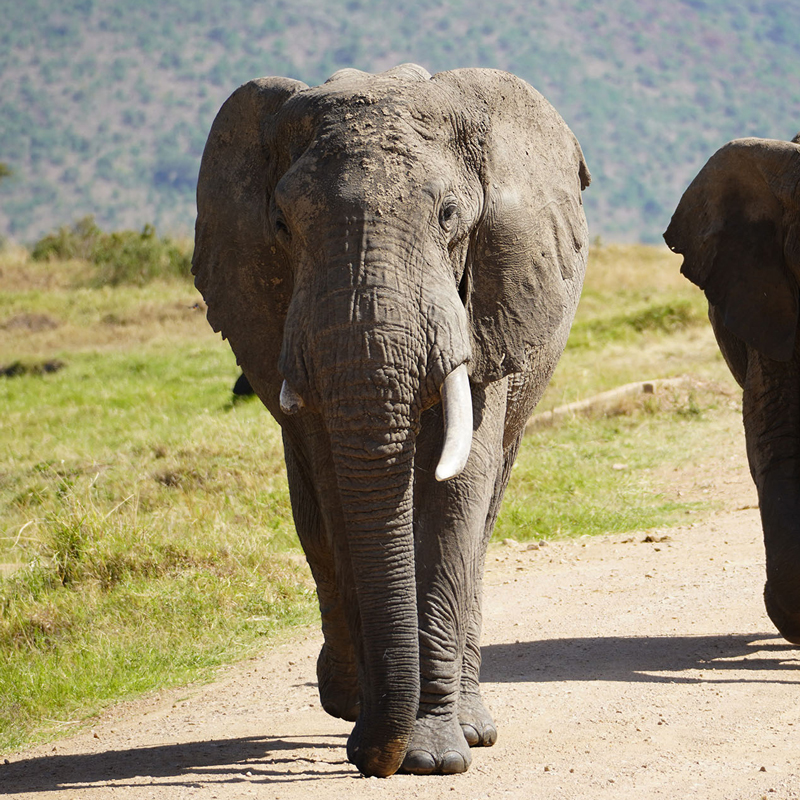The tragic slaughter of Africa’s wildlife is silently taking away one of the most precious things we have in the world.
Our Story
As we did more research, we discovered that more than 100,000 African elephants were killed between 2014 and 2017 for their ivory alone! One hundred thousand elephants killed in four years? What world are we living in where the need for some decorative ivory causes such evil pain and suffering to a majestic species such as elephants? If we can prevent or reduce this atrocity, and yet we stand by and do nothing, then we have some serious soul searching to do! We also discovered that more than a thousand rhino are slaughtered annually for their horns. In many cases, the animals were still alive and left to die a painful death after their horns were viciously cut out by poachers. This tragic slaughter is silently taking away one of the most precious things we have in the world.
I contacted representatives of the Kenyan government’s Kenya Wildlife Service, who said poaching is the biggest threat to the continued existence of Africa’s wildlife.
When we were children, Leili and I took Africa’s abundant, magnificent wildlife for granted. No more. As a successful owner of a global business (grizzly.com), in 2008 I launched a self-funded foundation for a variety of good causes. Now Leili and I would re-focus our foundation to saving Africa’s wildlife. In 2021, we changed the name from the S. Balolia Foundation to Shiraz & Leili Wildlife Foundation and have now opened it to outside donors to help with this cause.
As we did more research, we discovered that more than 100,000 African elephants were killed between 2014 and 2017 for their ivory alone! One hundred thousand elephants? What world are we living in where the need for some decorative ivory causes such evil pain and suffering to a majestic species such as elephants? If we can prevent or reduce this atrocity, and yet we stand by and do nothing, then we have some serious soul searching to do! We also discovered that more than a thousand rhino are slaughtered annually for their horns. In many cases, the animals were still alive and left to die a painful death after their horns were viciously cut out by poachers. This tragic slaughter is silently taking away one of the most precious things we have in the world.
I contacted representatives of the Kenyan government’s Kenya Wildlife Service, who said poaching is the biggest threat to the continued existence of Africa’s wildlife.
When we were children, Leili and I took Africa’s abundant, magnificent wildlife for granted. No more. As a successful owner of a global business (grizzly.com), in 2008 I launched a self-funded foundation for a variety of good causes. Now Leili and I would re-focus our foundation to saving Africa’s wildlife. In 2021, we changed the name from the S. Balolia Foundation to Shiraz & Leili Wildlife Foundation and have now opened it to outside donors to help with this cause.
Our mission is to combat poaching

Our mission is to combat poaching by channeling our foundation’s financial resources and efforts toward the very best wildlife conservation organizations, after personally vetting each one. (Poaching not only robs our world of wildlife but threatens those who work to protect animals; nearly 600 park rangers were hunted down by poachers between 2009 and 2016.) We have already engaged with Kenya Wildlife Service and are in the process of purchasing vehicles and such to better equip their park rangers. I’ve seen their existing equipment, and much of it is old and decrepit. To do their jobs well, they need better equipment, from patrol vehicles, to mobile veterinary field vehicles, to large flatbed trucks to transport wounded animals for rehabilitation. If any restricted equipment is needed, our foundation will export such equipment with proper permits from the United States Department of State, to ensure everything serves its intended purpose.
Like my businesses, the Shiraz & Leili Wildlife Foundation is tightly run, without bureaucracy or hierarchy. Leili and I are unpaid and will remain so. Our daughter, Jamila Melius, manages the foundation and takes a very low compensation, less than minimum wage annually. An owner of several businesses herself, she is committed to work for this essential cause with very little burden on the Foundation. We hear horror stories about foundations often paying their people huge sums of money. This defeats the purpose of doing charitable work!
To ascertain that our foundation’s money is going to save wildlife, we personally review any potential recipient organizations’ financial statements, meet with them, and ask pointed questions about money and management. We search out organizations that rely on volunteers, so that most of the money goes to its intended purpose.
See Our Work to learn about what we have accomplished so far & what still needs to be done.

